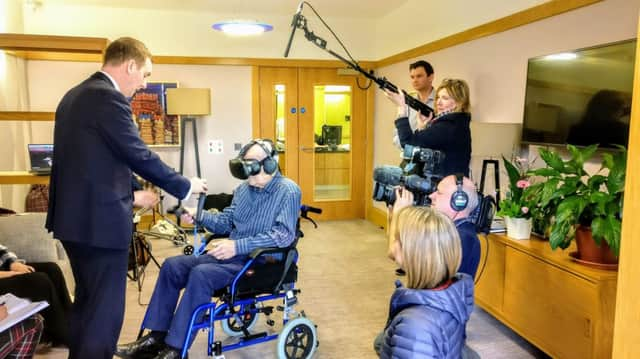Edinburgh palliative care patients try out virtual reality ‘trips’ in Scotland first


The interactive initiative, which can virtually transport patients to locations across the world, will look at the impact of virtual reality (VR) on patients’ health and wellbeing.
An initial group of six patients at St Columba’s Hospice benefitted from the transformative effects of VR when they were offered the chance to revisit some of their favourite places, or explore a part of the world they had never seen.
Advertisement
Hide AdAdvertisement
Hide AdUsing the latest high-tech VR headsets, one individual was transported to Jerusalem, a place he had always dreamed of visiting.
In another session, a 101-year-old lady revisited her childhood home in Darjeeling and indulged in a first “trip” up the Amazon river.
The experience is said to have triggered happy memories with the opportunity to reminisce about old times, as well as enjoying encountering new places.
The initial VR taster was run by Billy Agnew, founder of Viarama, the world’s first virtual reality social enterprise. The East Lothian initiative is now working in collaboration with Queen Margaret University and St Columba’s Hospice on a research project involving 20 hospice patients.
Advertisement
Hide AdAdvertisement
Hide AdThe project will look at the potential benefit of VR with a focus on patients’ mood, pain and stress levels, as well as overall wellbeing.
Dr Erna Haraldsdottir, director of education and research at St Columba Hospice, said of the patients: “It’s liberating and exciting for them to revisit a place that sparks happy memories or to indulge in an activity that once exhilarated them.
“It is exciting now to progress to a research project to gather the evidence of potential benefit.
“There is little evidence of VR being used in palliative care with no published research which identifies its potential in this important area of healthcare. We now need to establish the facts with more in-depth research to understand the immediate effects and the possible longer term impact on wellbeing and physical health.
Advertisement
Hide AdAdvertisement
Hide Ad“We are particularly keen to learn if VR sessions have the potential to alleviate symptoms in patients receiving palliative care, such as pain and anxiety.”
Five out of the six patients who took part in the taster session said they had a positive experience.
One patient was upset at the realisation she would never be able to revisit her favourite place ever again. However, she did say the experience helped her come to terms with her situation as she approached the end of her life.
Mr Agnew said: “Viarama is delighted to be, once again, working with St Columba’s Hospice and QMU.
Advertisement
Hide AdAdvertisement
Hide Ad“We look forward to giving many more hospice patients in Scotland the opportunity to enjoy the best VR experiences available, whilst exploring and measuring the many ways in which we believe VR helps people receiving palliative care.”